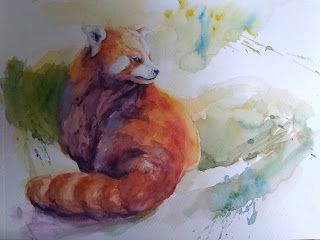Niggling Discursively...
Dear Kay,
In response to your 4th journal ...
Those are good questions and I don't have an answer for you. You will have to decide. I know it's not easy to decide. Why don't you try putting your present topic on the backburner and writing through your self-chosen "exile" (if I can put it that way)? If you were to produce some more journal entries on this, what would you say? Valerie Walkerdine says that it is important to pay attention to niggling things. In her case, it was the tendency in the discourse to talk about social class (a la Raymond Williams) without talking about the lived experience of social class, in this case, lower social class. So, she found herself in situations of being in people's homes that resembled her own upbringing, but she couldn't say that because it wasn't admissible in the academic discourse at the time. It niggled at her and niggled at her until finally, she decided to acknowledge where she came from and who she was and make that the cornerstone of her approach to research. Her situation is not the same as yours but it might be an opportune time, before you commit yourself to a particular topic, that you allow yourself to pause and think about what it is that you can see yourself doing over a long period of time and whether you enjoy those questions.
Having said that, there is also a rich (if sometimes agonizing) literature over just this question of subject position and who can speak for whom or what, and in that literature, the "essentialist" argument is clearly rejected: that just because one "is" a particular culture or had a particular experience, does not confer a sense of entitlement. So, even if you feel this ambiguity, and it doesn't feel comfortable, you can also make that part of your doctoral inquiry: to acknowledge those feelings and to address them "discursively."
Teresa
In response to your 4th journal ...
Those are good questions and I don't have an answer for you. You will have to decide. I know it's not easy to decide. Why don't you try putting your present topic on the backburner and writing through your self-chosen "exile" (if I can put it that way)? If you were to produce some more journal entries on this, what would you say? Valerie Walkerdine says that it is important to pay attention to niggling things. In her case, it was the tendency in the discourse to talk about social class (a la Raymond Williams) without talking about the lived experience of social class, in this case, lower social class. So, she found herself in situations of being in people's homes that resembled her own upbringing, but she couldn't say that because it wasn't admissible in the academic discourse at the time. It niggled at her and niggled at her until finally, she decided to acknowledge where she came from and who she was and make that the cornerstone of her approach to research. Her situation is not the same as yours but it might be an opportune time, before you commit yourself to a particular topic, that you allow yourself to pause and think about what it is that you can see yourself doing over a long period of time and whether you enjoy those questions.
Having said that, there is also a rich (if sometimes agonizing) literature over just this question of subject position and who can speak for whom or what, and in that literature, the "essentialist" argument is clearly rejected: that just because one "is" a particular culture or had a particular experience, does not confer a sense of entitlement. So, even if you feel this ambiguity, and it doesn't feel comfortable, you can also make that part of your doctoral inquiry: to acknowledge those feelings and to address them "discursively."
Teresa



Comments